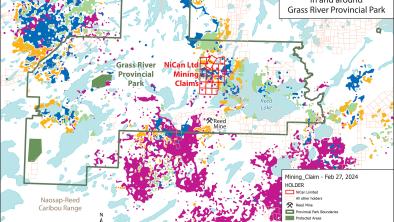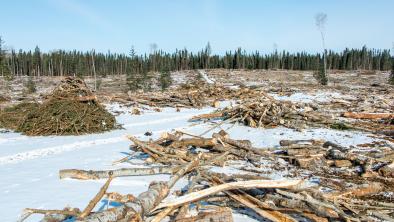Meeting pledges to work to save caribou
Winnipeg Free Press - Online Edition

Scientists, wildlife managers and aboriginal leaders have wrapped up a four-day summit by pledging to work to save endangered caribou but they didn’t release any plans for specific collaboration.
"I know all of us as First Nations leaders have said we want to be totally involved in all the decisions that affect our land and our wildlife," said former Northwest Territories premier Stephen Kakfwi said as the conference ended.
Kakfwi is also the former president of the Dene Nation and he acted as a leading spokesman for the North American Caribou Workshop in Winnipeg.
Specific recommendation to governments on how to put together collaborative agreements are the essential next step, the former premier suggested, raising the NWT experience as an example.
The Northwest Territories writes aboriginal rights and environmental welfare into formal protocols before industrial development can move ahead, Kakfwi said.
"I don’t know if it exists in Saskatchewan or Manitoba, but these are instruments we fought for here," Kakfwi said.
The former premier called for protocols to be put in place that call on First Nations, governments, environmental groups and industry to protect caribou herds.
"At some point the environmental groups, the Syncrudes, the Stelmaches and the First Nations all have to sit down and work together. We can’t keep fighting each other," Kakfwi said.
"If we don’t save the caribou, it will mean we’re not going to save the land or the water. It’s all interrelated and that’s what people keep missing," Kakfwi said.
The event was sponsored by the Manitoba government, Parks Canada and various environmental groups and it drew 400 people, mostly from Canada but also from the United States, Greenland, Norway and Germany.
The Western Canada Wilderness Committee staged a photo-op with a two-year-old in a snuggly caribou costume to wrap up the conference.
The toddler’s father, Eric Reder, the committee’s campaign director, said the stunt was intended to draw attention to the need to work harder to protect woodland caribou herds from the impacts of mining, logging and road building in Manitoba.
And climate change is putting barren lands herds under enormous strain, northern Manitoba Dene caribou management leader Albert Thorassie said.
A Canadian environmental organization with a leading role at the conference called on governments to work toward their conservation goals and recognize First Nations’ rights to manage their lands, at the same time.
"With so many caribou populations at an all time low, there is an urgency to understand how traditional knowledge can (lead to) protection of intact caribou habitat, like Canada’s boreal forest," Valerie Courtois, senior aboriginal relations advisor for the Canada Canadian Boreal Initiative said in a prepared statement.
Recent studies in Canada indicate whole herds of caribou in Quebec, British Columbia and Ontario are on the verge of collapse. Scientists at Yale University sounded a similar warning for herds world wide in September.
Photo: Woodland Caribou


